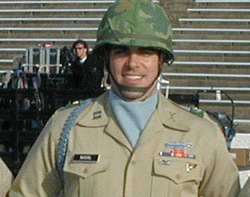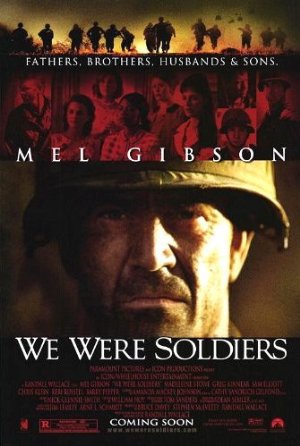We Were Soldiers Review
By David Levine

We Were Soldiers is based on the book We Were Soldiers Once...And Young written by Lieutenant Colonel Harold Moore and Joseph L. Galloway, the only journalist willing to go into the front lines to capture a first hand account of the war. In the film, Mel Gibson plays Harold Moore, a down-to-earth officer who is responsible for leading a group of innocent, naive young men into the area of Vietnam known as "The Valley of Death." But not soon after Lt. Col. Moore and his troops touch down, their position is compromised and they find themselves outnumbered almost 5 to 1. The American soldiers engage in a deadly battle for control of the area.
We Were Soldiers takes a different approach to the war story theme by addressing the emotional toll the war has on the soldiers and the families they left behind. The first third of the movie moves very slowly as it attempts to establish the relationships between the husbands and their families, and the military brass and their men. We learn that Moore is a family man who prides himself as much on his wife, Julie (Madeleine Stowe), and their five young children, as he does on his military career and his troops. Moore congratulates Lt. Jack Geoghegan (Chris Klein) and his wife Barbara (Keri Russell) on the birth of their first child as the two pray together before heading into battle.
While at war, we're introduced to journalist Joe Galloway (Barry Pepper). Despite the strong military background of his family, Galloway wants to capture the war through images and writings so that people back in America can understand what happens on the front lines. During the height of the battle, Command Sergeant Major Basil Plumley (Sam Elliott) instructs Galloway to trade his camera for a gun. Though Galloway takes to battle like the others and even carries a soldier's charred body to a rescue chopper, he eventually throws his gun down and returns to taking pictures.
The telling of the human aspect of the war is not limited to the events that unfold in the American camp. We are also given interesting views into the strategy used by the Vietnamese during battle, as well as their sorrow when they pick up their fallen comrades. But the focus of the film is clearly on Moore and Galloway, the only two characters that have any degree of depth--all others are drawn extremely thin. Sgt. Maj. Plumley's sole purpose is to provide some scenes of comic relief between the orders he barks at the troops; Lt. Geoghegan is given one key scene in the beginning, but later he is only seen once before he ends up as a casualty of war.
Back at home, the only screen time given to tell the war's impact on the wives and families is when they receive the tragic news that their husbands and fathers have died in battle. We never see their struggle to raise their families alone, or the immediacy to scrape up whatever information they could on the war and the status of their loved ones. We never see the trouble Julie has in addressing the concerns her young children have for their father being at war, or the difficulty Barbara has being a young mother with a newborn child.
Despite its best intentions, We Were Soldiers is just another in a long line of graphic war movies depicted in realistic detail. The cinematography is very striking and has a journalistic feel, as if we are on the front lines looking in on the action as told through the lens of Galloway's camera. As soldiers are shot and wounded, their blood splatters on the lens (and thus, the movie screen). Many of the battle scenes are shown in slow motion, using quick edits that are choreographed to moving scores and songs meant to evoke emotion. We really feel like we're with those troops as they push through the Valley of Death.
The humanistic approach behind We Were Soldiers is well intended, but the concept is not fully realized in the short amount of time devoted to the movie. If the battle sequences had been shortened and the film's opening scenes tightened up, it's possible this theme could have worked to the film's advantage and provided the right sentiment to sustain our current sense of patriotism. Though certainly not a bad film, it fails to give us the complete picture of how the battle impacted the key players and sadly, We Were Soldiers will be remembered more for the gritty war scenes than the emotional toll on those it meant to show.
The DVD features commentary from Wallace, 10 deleted scenes, and an interview with Madeleine Stowe's wig. The only one of those I really cared to see, unfortunately, doesn't really exist.
We were very happy soldiers.

Facts and Figures
Year: 2002
Run time: 138 mins
In Theaters: Friday 1st March 2002
Box Office USA: $78.1M
Box Office Worldwide: $114.7M
Budget: $75M
Distributed by: Paramount Pictures
Production compaines: Paramount Pictures, Icon Productions
Reviews
Contactmusic.com: 3 / 5
Rotten Tomatoes: 63%
Fresh: 90 Rotten: 53
IMDB: 7.1 / 10
Cast & Crew
Director: Randall Wallace
Producer: Stephen McEveety, Bruce Davey, Randall Wallace
Screenwriter: Randall Wallace
Starring: Mel Gibson as Lt. Col. Hal Moore, Greg Kinnear as Maj. Bruce 'Snake' Crandall, Madeleine Stowe as Julie Moore, Sam Elliott as Sgt. Maj. Basil Plumley, Chris Klein as 2nd Lt. Jack Geoghegan, Keri Russell as Barbara Geoghegan, Barry Pepper as Joe Galloway, Clark Gregg as Capt. Tom Metsker, Marc Blucas as 2nd Lt. Henry Herrick, Jsu Garcia as Capt. Tony Nadal, Robert Bagnell as 1st Lt. Charlie Hastings, Blake Heron as Sp4 Galen Bungum, Josh Daugherty as Sp4 Robert Ouellette, Jon Hamm as Capt. Matt Dillon, Dylan Walsh as Capt. Robert Edwards, Erik MacArthur as Sp4 Russell Adams, Mark McCracken as Capt. Ed 'Too Tall' Freeman, Desmond Harrington as Sp4 Bill Beck, Duong Don as Lt. Col. Nguyen Huu An, Ryan Hurst as Sgt. Ernie Savage
Also starring: Stephen McEveety, Bruce Davey, Randall Wallace














